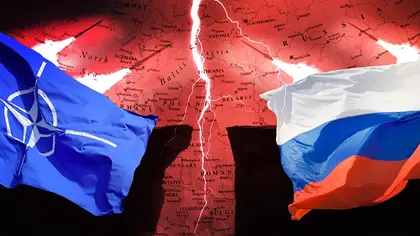When it comes to threatening their neighbors, Moscow has a talent for keeping you guessing.
Having announced NATO as its number one enemy that must be stopped at all costs, and using it as one of the many pretexts for invading Ukraine, Russia has been prolific in spewing out threats toward all countries eyeing membership of the Alliance.
JOIN US ON TELEGRAM
Follow our coverage of the war on the @Kyivpost_official.
Sweden and Finland, who until recently favored neutrality in the foreign policy domain, are no exception to Russia’s incessant menaces, with Dmitry Medvedev, the deputy chairman of the security council of Russia, among the first officials to comment extensively on Helsinki and Stockholm’s aspirations to discard neutrality.
Using a sarcastic and emotionally-charged tone with several references to well-known Soviet movies, Medvedev noted in April that Russia does not care how many members states NATO has – 30 or 32 – given Sweden’s and Finland’s small populations. However, since Russia’s borders with NATO would increase twofold, Moscow “will have to strengthen them”, bolstering ground forces and air defense, deploying significant naval forces in the waters of the Gulf of Finland, and ensuring that the Baltic is no longer a non-nuclear space.
“The balance will have to be restored,” he said, emphasizing that “Russia has never planned such measures and was not willing to take them. It will be forced to do so.”
Defying common sense and blunt statements made in both Helsinki and Stockholm that Russia’s war in Ukraine triggered their decision to join NATO, he said that “attempts to drag them into the Alliance had taken place before.”
However, Medvedev’s lampoon, of which there are many on his Telegram channel, did not stop the two countries from seeking NATO membership at the beginning of May, culminating in a full-fledged decision to submit their membership bid in recent days.
In response, Russia’s Deputy Foreign Minister Sergei Ryabkov said that Moscow will not “put up with” their decision, which is a “mistake” that will have “far-reaching consequences.”
“They should have no illusions that we will simply put up with it. The general level of military tension will increase, and predictability in this area will become less. It is a pity that common sense is being sacrificed for some phantom ideas about what should be done in the current situation,” Ryabkov noted before Russia’s threatener-in-chief stepped in to comment on the decision.
During his speech at the Collective Security Treaty Organization’s summit on May 16, Russia’s President Vladimir Putin first pretended in his trademark manner that he does not care about the Nordic states’ decision to join the Alliance as it poses no threat to Russia. Then, however, he added that the military expansion into this territory would trigger a response, which depends on the level of threat arising.
On the same day, Russia’s Ministry of Foreign Affairs (MFA) echoed Putin’s stance while also underscoring that Sweden’s membership in the Alliance will deprive Stockholm of its sovereignty in the foreign policy domain, promising to take reciprocal measures, including military and technical ones.
Enter Maria Zakharova, Russia’s MFA spokesperson known for statements that range from the bizarre to the utterly bizarre, including her assertion that Ukrainian borscht, a beetroot soup usually served with garlic-soaked bread, is a form of extremism.
Following Sweden and Finland’s official submission of their membership bids on Wednesday, Zakharova decided to add an air of mystery to the already bountiful pool of threats issued by Russian officials at different levels.
According to her, Russia is preparing a “surprise” for Finland that will depend on its Ministry of Defense.
“Naturally, the decision will be made by taking account of all the factors and peculiarities of Finland’s membership in NATO,” she said, without explaining why the Ministry of Defense is not contemplating “surprises” for Sweden too.
While it rarely pays off to analyze the promises made by Russian officials, given the Kremlin’s history of gushing threats, both overt and covert, there is a good chance that the “surprise” will entail the deployment of tactical nuclear weapons in the Baltic Sea, which Medvedev has discussed in detail several times. Other types of “surprises” might include cutting off gas supplies, launching cyberattacks, blocking oil and agricultural exports, and once again threatening others with nuclear weapons for the message to sink in.
Regardless of which “surprise” Zakharova and her colleagues have in mind, Sweden and Finland’s decision to join NATO is no smaller a blow to Russia than Moscow’s subpar performance in Ukraine, with the Russian army being defeated in the battles for Kyiv and Kharkiv and advances in Donbas stalled.
As a result of the Alliance’s expansion, NATO will effectively control the Baltic coast, shorten the flying time to Saint-Petersburg and Moscow, and ensure a seamless passage to the Northern Atlantic for the U.S. – none of which should be a real surprise to a country that still lives in the deranged bubble of its military grandeur.
You can also highlight the text and press Ctrl + Enter



